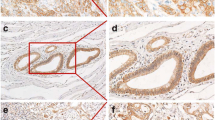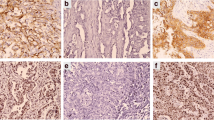Abstract
The significance of over-expression of epidermal growth factor receptor (EGFR) in pancreatic carcinoma is unclear. In this study, we examined the association between EGFR over-expression (membranous and cytoplasmic), the associated histopathologic features and clinical outcomes in post-resection pancreatic cancer patients. EGFR expression was determined immunohistochemically in 90 patients who underwent resection for pancreatic cancer. Cytoplasmic expression was considered positive if EGFR expression was seen in the cytoplasm in ≥10% of cells. Cell membrane staining was scored from 0 to 3+, with 2+ and 3+ being considered as membrane over-expression. Overall survival and progression-free survival were calculated using the Kaplan–Meier method, and survival curves were compared by the log-rank test. Out of 90 patients, 51 (57%) and 74 (68%) patients had membrane and cytoplasmic EGFR over-expression, respectively. There was a statistically significant correlation between cell membrane EGFR over-expression and lymph node positivity (P = 0.03). Patients with membrane EGFR over-expression had a shorter median progression-free survival (10.7 vs. 17.0 months, P = 0.02) and overall survival (15.9 months vs. 25.3 months, P = 0.17). Cytoplasmic EFGR over-expression was not significantly associated with recurrence or survival. Membrane EGFR over-expression in resected pancreatic cancer patients was associated with worse clinical outcomes than non-over-expression.




Similar content being viewed by others
References
Jemal A, Siegel R, Xu J, Ward E. Cancer statistics, 2010. CA Cancer J Clin. 2010;60:277–300.
Lemoine NR, et al. The epidermal growth factor receptor in human pancreatic cancer. J Pathol. 1992;166:7–12.
Nicholson RI, Gee JM, Harper ME. EGFR and cancer prognosis. Eur J Cancer. 2001;37(Suppl 4):S9–15.
Kopp R, et al. Clinical implications of the EGF receptor/ligand system for tumor progression and survival in gastrointestinal carcinomas: evidence for new therapeutic options. Recent Results Cancer Res. 2003;162:115–32.
Faller BA, Burtness B. Treatment of pancreatic cancer with epidermal growth factor receptor-targeted therapy. Biologics. 2009;3:419–28.
Yamanaka Y. The immunohistochemical expressions of epidermal growth factors, epidermal growth factor receptors and c-erbB-2 oncoprotein in human pancreatic cancer. Nippon Ika Daigaku Zasshi. 1992;59:51–61.
Yamanaka Y, et al. Coexpression of epidermal growth factor receptor and ligands in human pancreatic cancer is associated with enhanced tumor aggressiveness. Anticancer Res. 1993;13:565–9.
Dong M, et al. Epidermal growth factor and its receptor as prognostic indicators in Chinese patients with pancreatic cancer. Anticancer Res. 1998;18:4613–9.
Uegaki K, et al. Clinicopathological significance of epidermal growth factor and its receptor in human pancreatic cancer. Anticancer Res. 1997;17:3841–7.
Gansauge F, Gansauge S, Muller J, Schmid E, Beger HG. Prognostic value of molecular biology and immunologic parameters in human pancreatic carcinoma. Langenbecks Arch Chir Suppl Kongressbd. 1998;115:69–72.
Kuniyasu H, Abbruzzese JL, Cleary KR, Fidler IJ. Induction of ductal and stromal hyperplasia by basic fibroblast growth factor produced by human pancreatic carcinoma. Int J Oncol. 2001;19:681–5.
Tobita K, et al. Epidermal growth factor receptor expression in human pancreatic cancer: significance for liver metastasis. Int J Mol Med. 2003;11:305–9.
Ueda S, et al. The correlation between cytoplasmic overexpression of epidermal growth factor receptor and tumor aggressiveness: poor prognosis in patients with pancreatic ductal adenocarcinoma. Pancreas. 2004;29:e1–8.
Bloomston M, Bhardwaj A, Ellison EC, Frankel WL. Epidermal growth factor receptor expression in pancreatic carcinoma using tissue microarray technique. Dig Surg. 2006;23:74–9.
Takikita M, et al. Associations between selected biomarkers and prognosis in a population-based pancreatic cancer tissue microarray. Cancer Res. 2009;69:2950–5.
Zhang L, Yuan SZ. Expression of c-erbB-2 oncogene protein, epidermal growth factor receptor, and TGF-beta1 in human pancreatic ductal adenocarcinoma. Hepatobiliary Pancreat Dis Int. 2002;1:620–3.
Piyathilake CJ, et al. Differential expression of growth factors in squamous cell carcinoma and precancerous lesions of the lung. Clin Cancer Res. 2002;8:734–44.
Akslen LA, Myking AO, Salvesen H, Varhaug JE. Prognostic impact of EGF-receptor in papillary thyroid carcinoma. Br J Cancer. 1993;68:808–12.
Bruns CJ, et al. Blockade of the epidermal growth factor receptor signaling by a novel tyrosine kinase inhibitor leads to apoptosis of endothelial cells and therapy of human pancreatic carcinoma. Cancer Res. 2000;60:2926–35.
Ng SS, Tsao MS, Nicklee T, Hedley DW. Effects of the epidermal growth factor receptor inhibitor OSI-774, Tarceva, on downstream signaling pathways and apoptosis in human pancreatic adenocarcinoma. Mol Cancer Ther. 2002;1:777–83.
Moore MJ, et al. Erlotinib plus gemcitabine compared with gemcitabine alone in patients with advanced pancreatic cancer: a phase III trial of the National Cancer Institute of Canada Clinical Trials Group. J Clin Oncol. 2007;25:1960–6.
Xiong HQ, et al. Cetuximab, a monoclonal antibody targeting the epidermal growth factor receptor, in combination with gemcitabine for advanced pancreatic cancer: a multicenter phase II trial. J Clin Oncol. 2004;22:2610–6.
Author information
Authors and Affiliations
Corresponding author
Rights and permissions
About this article
Cite this article
Mahipal, A., Mcdonald, M.J., Witkiewicz, A. et al. Cell membrane and cytoplasmic epidermal growth factor receptor expression in pancreatic ductal adenocarcinoma. Med Oncol 29, 134–139 (2012). https://doi.org/10.1007/s12032-010-9802-y
Received:
Accepted:
Published:
Issue Date:
DOI: https://doi.org/10.1007/s12032-010-9802-y




